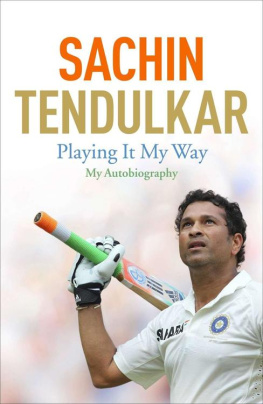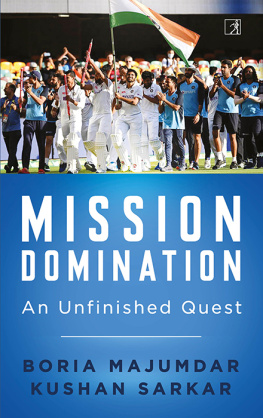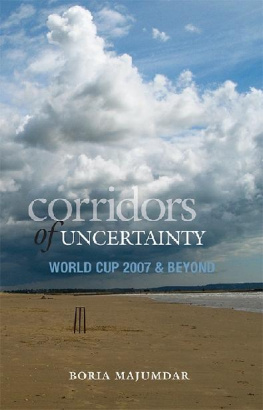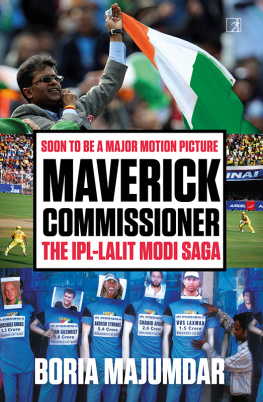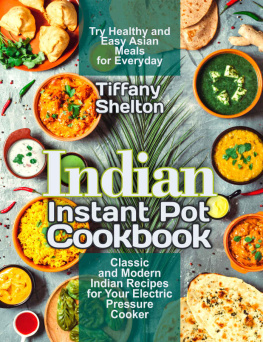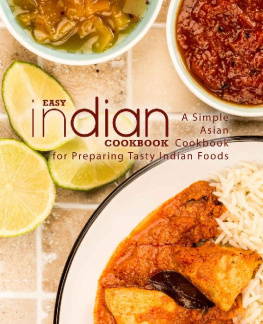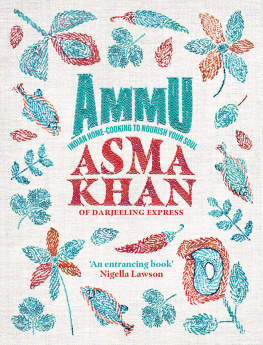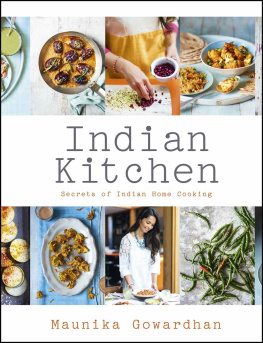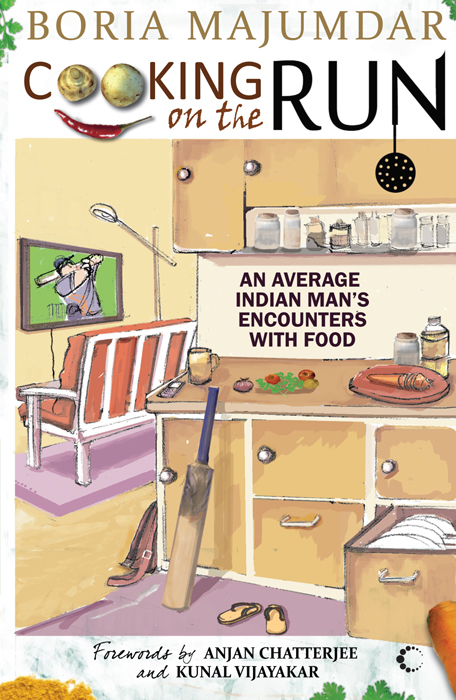
Cooking on the Run
Boria Majumdar

An imprint of HarperCollins Publishers
www.harpercollins.co.in
For my mother, Roopa, for feeding me all the delicacies and shaping my taste buds and my grandmother, Sumita, who left us before this book could go into print, but who taught me to enjoy food as a child.
When I heard about Borias plans for this book, my first thought was whether Boria even knew that he had always had it in him. About a year ago in Kolkata, while enjoying our common passion, food, Boria spoke so animatedly about his culinary encounters and experiences in various parts of the world that even then I smelt a book somewhere, over the aroma of the biryani we were enjoying.
Cooking on the Run, however, is about much more than one mans passion. It confirms all the perplexing emotions that hide beneath the benevolent lid of home-cooked food. Till the average young urban Indian finds themselves far from home, the moment home falls away beyond the horizon, what has always been a soothing taste in life suddenly tightens into a tempestuous tug. The book doesnt miss a single dilemma in the fresh of the boat Indian students eye.
Where Boria Majumdars cookbook breaks away from the tradition of expert culinary advice, it gains a freshers mindfulness and enthusiasm for learning. The careful observations accompanying most recipes are vastly enlightening, Boria, so it is your extreme modesty alone that will see this book as a survival mechanism. For novices, the book is an essential travel companion when leaving Indian shores. For the jaded regular, it turns the kitchen inside out, shaking out all the surprises, misadventures, discoveries, heartbreaks, milestones and friendships that have collected in the kitchen during the course of ones experience. We are indebted to Cooking on the Run for re-establishing cooking as a personal expression, and for helping all our imperfect touches and moments of self-discovery reclaim their place in the art.
While most cookbooks will readily acknowledge that cooking is an art, it is a rare one that will give necessity its due for sparking a lot of this creativity. I am so glad that this book delves into all the hidden forces, from language barriers to missing home food, that make a cook out of a hopeless foodie. Cooking seems less like a high art here, but it becomes all the more passionate.
Chasing away winter blues in Chicago with piping hot biryani, wistfully rolling in Kolkatas Telebhaja carts alongside the kabab vans in Oxford, these pages are full of such accounts of food and nostalgia. Boria puts down every recipe as a sort of milestone, the primary reason for their being in this book being how they changed the authors life. This confirms a very vital, healthy lust we all share to a greater or lesser degree for food.
Anjan Chatterjee
Boria Majumdar has lost a lot of weight. A few months ago, you would have believed him if he said that he was writing a book about food. But in his slim and trim avatar, he appears more like the well-known cricket scholar he is than a culinary writer.
For those who have watched Boria Majumdar on television, the obvious assumption would be that any book bearing his name as the author would have to do with cricket. To the average television viewer, Boria Majumdar is the pugnacious, magisterial cricket pundit who bombasts the tube with a persuasion and reckoning far beyond his visible age. To a cricket aficionado, Boria is an astute, profoundly knowledgeable observer of the game, whose neck you may want to wring, but whose insight, surveillance and scrutiny cannot be ignored.
What then is this man doing, writing a book about food? Well there is a side to him that I got to discover quite happily about a year ago. When he found out I was in Kolkata, eating at a quaint traditional Bengali restaurant, Boria charged over to do what any foodie would do have a conversation about food. Hed already eaten lunch, so while I discovered the remarkable tastes of jhol, torkari and bhaja, Boria regaled me with erudition that ranged from the subtle regional differences of Bangla tastes, the nuances of Bangla flavours, the origins of Bangla eating habits, right to the controversial possibility that the famed rosogolla may not necessarily be a creation of Bengal.
The hour we spent together was like gastronomic coitus. Since then Boria and I, whenever we have crossed paths, have never talked cricket, but food instead. So I am not surprised that Boria has put his pen to paper and written about a passion that may just be his real one.
Cooking on the Run is not just about food as much as it is about the experience of food, both exotic and from home.
Beneath its guise of a survival guide for the Indian male who cannot cook, the book is empirical; an astonishing observation of people and society, especially the vulnerability of the average Indian male when it comes to hustling up a meal for himself. Chronicling his own quests for a decent meal when alone in a strange place, the book can guide any of us spoilt men into becoming at least above average, if not expert, in basic culinary skills. Featuring recipes that are effortless for the coddled Indian male and a welcome reprieve for the women who slave in front of the fire, he helps you discover food and the art of cooking as he did.
Boria Majumdar bashfully calls himself a fill-in cook. Id like to give this book a little more credit that he does. The book comes from a mind that is always assertive, emphatic, absolute and charmingly insolent. Thats what makes Boria piquant, spicy, appetizing, and well-seasoned. Exactly like his book, Cooking on the Run.
Kunal Vijayakar
Cookbooks, which usually belong to the humble literature of complex civilizations, tell unusual cultural tales. They combine the sturdy pragmatic virtues of all manuals with the vicarious pleasures of the literature of the senses. They reflect shifts in the boundaries of edibility, the proprieties of the culinary process, the logic of meals, the exigencies of the household budget, the vagaries of the market and the structure of domestic ideologies. The existence of cookbooks not only presupposes some degree of literacy, but often an effort on the part of some variety of specialist (emphasis mine) to standardize the regime of the kitchen, to transmit culinary lore, and to publicise particular traditions guiding the journey of food from marketplace to kitchen to table.
Arjun Appadurai in How to Make a National
Cuisine: Cookbooks in Contemporary India
Cooking on the Run does none of the above. Nor does it aspire to. It is simply the average Indian mans survival mechanism in times of need. It is meant for those who love their home food but cant cook, who travel widely and miss home fare and those who would prefer to cook occasionally rather than experiment with alien cuisine, attempts that are likely to end up as burnt inedible messes. It is not the work of a specialist, nor is meant for the specialist. It is the handiwork of an average Indian who loves to eat his own food, and is meant for others like him. It does not have a grandiose purpose. It only aims to inspire confidence in many of my ilk, men who arent likely to cook under normal circumstances. It has one message if you learn to cook, you end up living better.
Born and brought up in a middle class family in India, especially if you are the only male child in the house, you tend to take food for granted. Mothers, grandmothers and domestic help, both male and female, serve you the best of delicacies and pamper you on days when you throw unnecessary tantrums. It is a life of privilege. Only when we have to fend for ourselves do we learn to appreciate the value of what we had, delicious home-cooked meals twice a day without even having to ask. It is only when we leave home that we ask ourselves: did I really do justice to the food I was given at home or should I have been more appreciative of what I was served?
Next page

